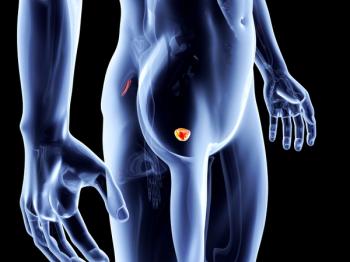
Despite Trends Towards PFS, OS Improvement, Pembrolizumab/Lenvatinib Trial in HCC Misses Primary End Points
Although patients with unresectable hepatocellular carcinoma initially appeared to have survival benefit following treatment with pembrolizumab and lenvatinib vs lenvatinib alone, the findings did not meet statistical significance.
Treatment with pembrolizumab (Keytruda) and lenvatinib (Lenvima) appeared to result in some improvement in overall survival (OS) and progression-free survival (PFS) compared with lenvatinib monotherapy in patients with unresectable hepatocellular carcinoma (HCC), however study end points from the phase 3 LEAP-002 trial (NCT03713593) ultimately missed the threshold for significance, according to a press release from Merck.
Despite initially improved outcomes reported from the trial, OS and PFS did not meet statistical significance by the prespecified statistical plan. The median OS of the lenvatinib monotherapy arm in LEAP-002 was longer than what has been observed in previous clinical trials evaluating the single-agent in unresectable HCC.
Data from the trial are set to read out at an upcoming medical conference.
“Our joint clinical development program Keytruda plus Lenvima is designed to address unmet needs for some of the most challenging-to-treat types of cancer, like hepatocellular carcinoma,” Gregory Lubiniecki, MD, vice president of Global Clinical Development at Merck Research Laboratories, said in a press release. “We remain confident in the potential of this combination based on the body of evidence we’ve seen to date and will continue to investigate its role across multiple types of cancer.”
A total of 794 patients were included in the study. Patients in both arms received 8 mg/kg or 12 mg/kg of lenvatinib, with the experimental arm receiving 200 mg of pembrolizumab on day 1 of every 21-day cycle up to a maximum of 35 cycles. Lenvatinib was administered until progressive disease or unacceptable toxicities occurred.
Secondary end points included objective response rate, duration of response, disease control rate, and time to disease progression.
To enroll on the trial, patients were required to have disease confirmed by radiology, histology, or cytology with Barcelona Clinic Liver Cancer Stage C disease or B disease not amenable to locoregional treatment options or refractory to locoregional treatments. A Child-Pugh class A liver score and life expectancy of over 3 months were also required for enrollment.
Those with esophageal or gastric variceal bleeding within the previous 6 months, conditions that might impact lenvatinib absorption, and preexisting grade 3 or higher fistula were not able to enroll. Other exclusion criteria included clinically significant hemoptysis within 2 weeks, significant cardiovascular impairment within 12 months, and major surgery within 4 weeks.
“Aiming for further improvement in the treatment of patients with unresectable HCC, we selected [lenvatinib] monotherapy, a standard of care option, as the control arm of the LEAP-002 trial,” Corina Dutcus, MD, senior vice president of Clinical Research, Oncology at Eisai Inc, concluded. “While results evaluating the combination are not what we had hoped for, we will continue to contribute to the care of patients with unresectable HCC by applying valuable knowledge from the LEAP-002 trial.”
Reference
Merck and Eisai provide update on phase 3 LEAP-002 trial evaluating KEYTRUDA® (pembrolizumab) plus LENVIMA® (lenvatinib) versus LENVIMA monotherapy in patients with unresectable hepatocellular carcinoma. News release. Merck. August 3, 2022. Accessed August 3, 2022. https://bit.ly/3Sq75Jy
Newsletter
Stay up to date on recent advances in the multidisciplinary approach to cancer.














































